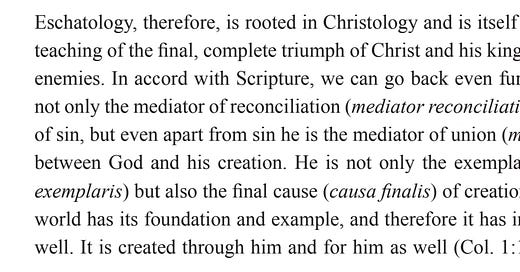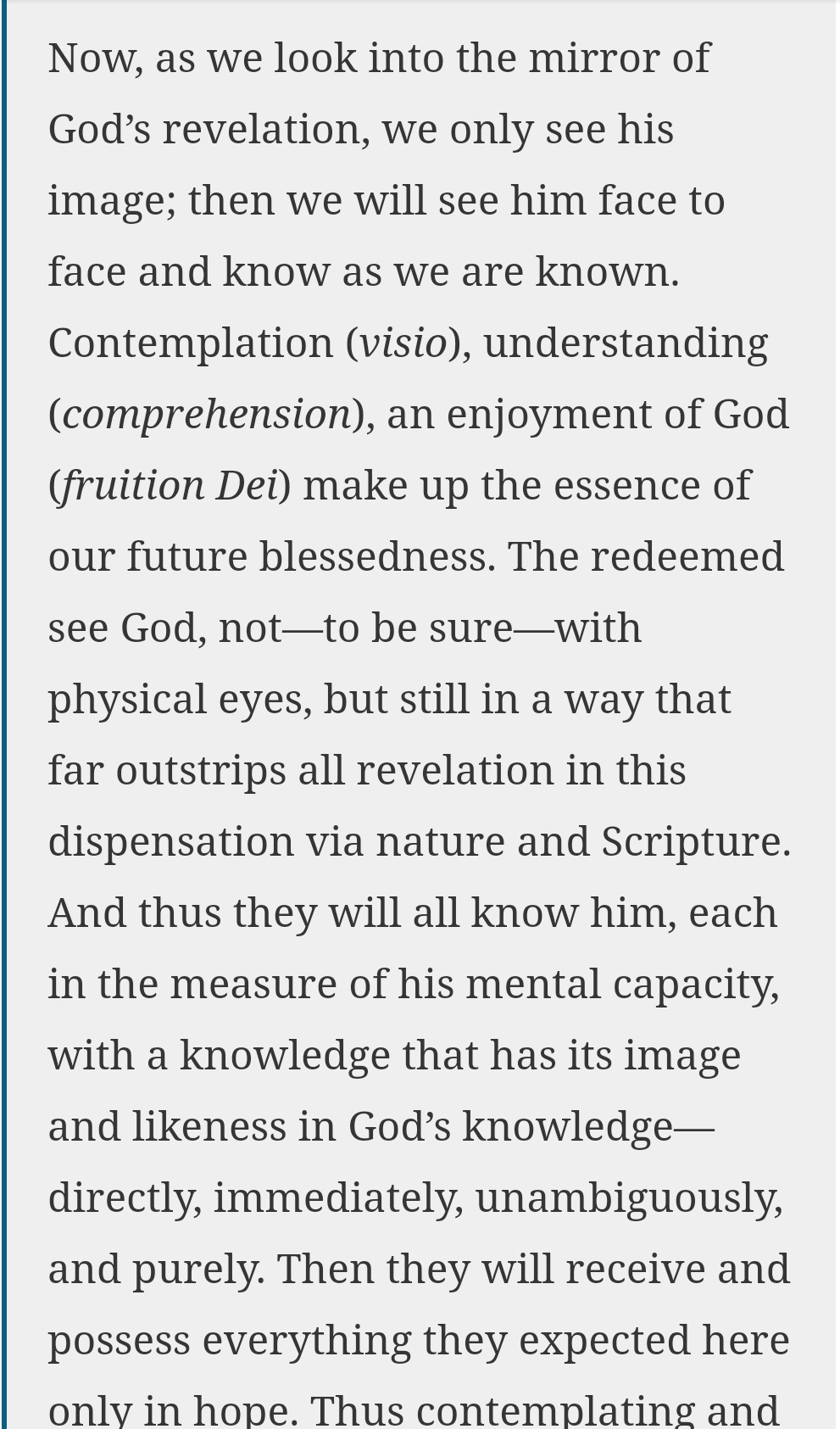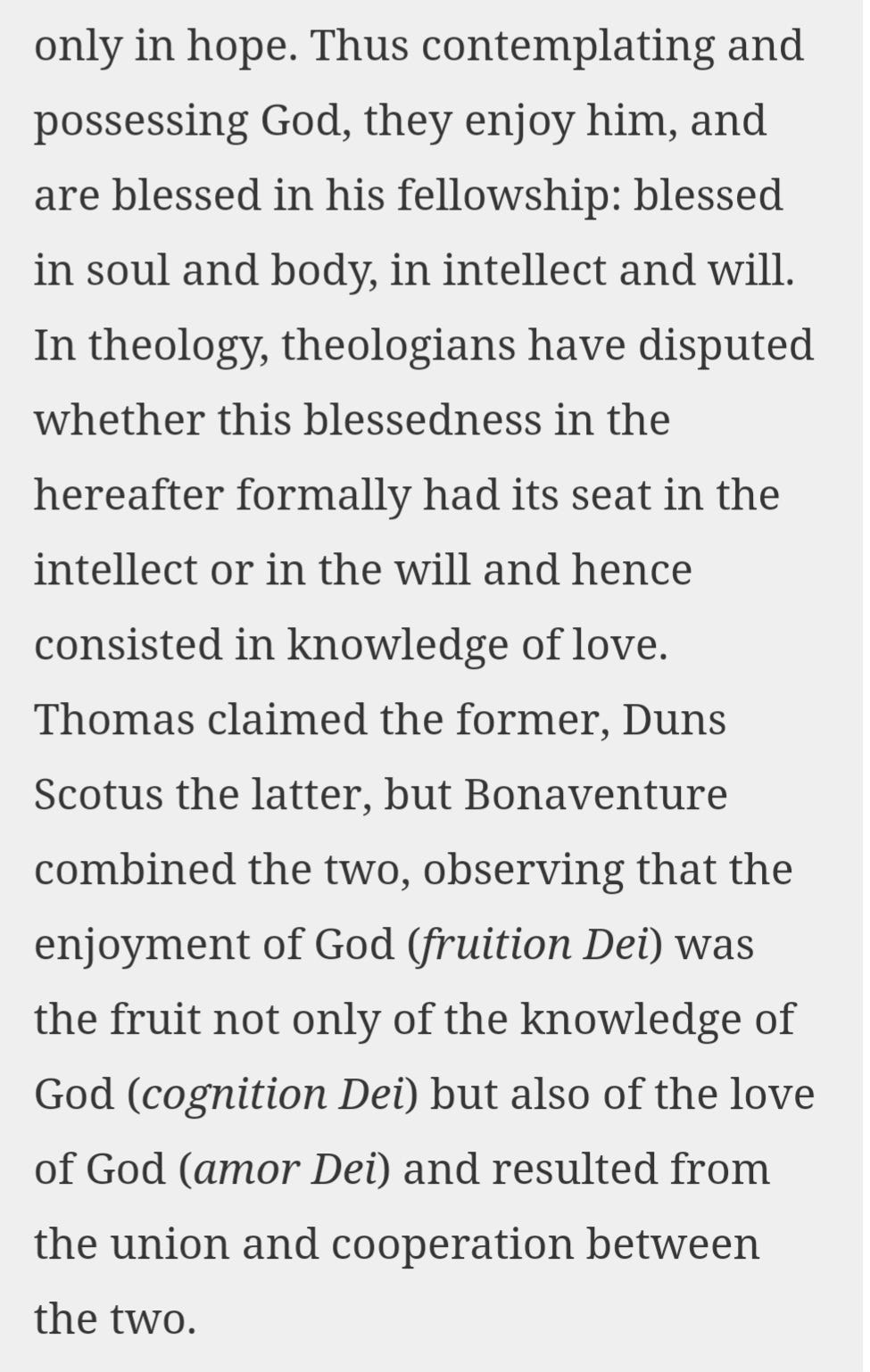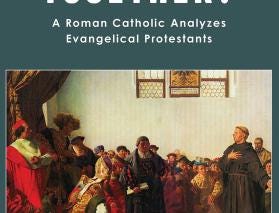A Roundup of Sources Comparing Bavinck’s ‘nature & grace’ and de Lubac’s ‘nouvelle théologie’
what they might mean for Christian Protology, History & Eschatology
From what I have gathered in cursorily paging thru Brian G. Mattson’s _Restored to Our Destiny – Eschatology & the Image of God in Herman Bavinck’s Reformed Dogmatics_ (2012), Bavinck’s body of work expresses the view that there’s an organic relation between nature & grace. His theoanthropology seamlessly moves between protological, historical & eschatological accounts with a significant systematic continuity, precisely because of that organic relation.
Consider this excerpt from Bavinck’s Reformed Dogmatics 4:685.
Taken out of its Neo-Calvinist context, Bavinck’s account of nature & grace would be hard to distinguish from de Lubac’s nouvelle théologie?
Especially consider this excerpt from Bavinck’s Reformed Dogmatics 4:72
Finally, consider these snippets from Mattson’s _Restored to Our Destiny – Eschatology & the Image of God_
Future “blessedness” for Adam in paradise does not imply a present lack of blessing; future eternal life promised to Adam does not imply a present lack of life; and future fellowship with God does not imply a present estrangement. pg 98
Adam and Eve were not created in eschatological perfection; hence, his first words on human destiny: Although Adam was created in God’s image, he was not that image immediately in the full sense … pg 100
The Image of God Bavinck again brings into view creation as intrinsically revelatory of God’s perfections, and further suggests that Adam, as imago Dei, is the preeminent revelation of God. pg 115
Adam’s virtues were free gifts of God constantly maintained by his providence, that is, his indwelling …
pg 140
Bavinck again emphasizes the distinction between Adam’s created, not-yet-fallen, sub-eschatological “blessedness” and that awaiting the righteous. pg 144
as good as it was, “Paradise was not heaven.” pg 145
The image of God then becomes a ‘superadded gift’ (donum superadditum).” On the contrary, general revelation maintains the unity of nature and grace, the world and the kingdom of God, natural and moral orders … pg 172
Bavinck’s final summation of his doctrine of human nature closed with the telling words: “Adam, the son of God, was a type of Christ.” pg 201
Paradise must not already be conceived as heaven; it must be a sub-eschatological reality moving toward an eschatological telos.
pg 240
Cory C. Brock, in Revisiting Bavinck and the Beatific Vision, Journal of Biblical and Theological Studies 6.2 (2021): 367 – 382, writes: “For Bavinck, fellowship with God, the Immanuel principle, is the entire point of human existence. Yet, one need not draw a dichotomy between fellowship with God and sociality in the heavenly life among fellow creatures and the land. For Adam was made to dwell in the adamah.”
Again, we might ask, taken out of its Neo-Calvinist context, wouldn’t Bavinck’s account of nature & grace be hard to distinguish from de Lubac’s nouvelle théologie?
In Gregory W. Parker’s
“Reformation or Revolution? Herman Bavinck and Henri de Lubac on Nature and Grace,” he draws some legitimate (& some questionable) distinctions between the systematics of Bavinck & de Lubac.
Anthony Costello, in his recent review of Eduardo Echeverria’s _Are We Together?_ writes: “Echeverria argues for a position defended by Jaques Maritain, that grace restores nature to its original capacity, so that it might attain its originally intended ends. But this is not done from without, but from within.”
Costello, considering Reformed theologian Al Wolters’ stance, continues: “Grace restores nature to function properly according to its divinely intended ends,” not to some merely natural end, nor to some end that it did not have prior to grace.”
Book Review: “Are We Together?” Eduardo Echeverria’s Catholic Analysis of Evangelical Protestants
Eduardo J. Echeverria, Are We Together: A Roman Catholic Analyzes Evangelical ProtestantsHobe Sound, Florida: Lectio Publishing, 2022. Pp. 206 Paper. $21.75 ISBN 978-1-943901-24-01 Eduardo Echeverria’s book, Are We Together: A Roman Catholic Analyzes Evangelical Protestants, is a careful and charitable response to some recent Evangelical works against Roman Catholicism. Echeverria, holds a Licentiate in Sacred Theology (University … Continue reading
In Eduardo Echeverria‘s review of _Herman Bavinck, Philosophy of Revelation_ he writes: “The Christian faith’s hope for the value of human life “is inseparably connected with the future.” He explains, “If the world at the end of its development is dissolved in a chaos [see Bertrand Russell’s 1903 essay, ‘A Free Man’s Worship’], or sinks back into everlasting sleep, the value of personality, of religious and ethical life, and also of culture cannot be maintained”. Bavinck’s eschatological perspective leaves us with a positive vision that Christian revelation is life affirming. That is certainly good news for modern man.”
I would amend that: “If any person at the end of their development is dissolved in a chaos [see Bertrand Russell’s 1903 essay, ‘A Free Man’s Worship’], or sinks back into everlasting sleep, the value of personality, of religious and ethical life, and also of culture cannot be maintained”.
After all, “the individual can attain perfect fulfillment only when all the others have also
attained to perfect fulfillment” ~ Walter Kasper
For those who want to dig deeper, see direct downloads, below:
Gayle Elizabeth Doornbos‘ thesis: The Ontological, Cosmological, and Soteriological Dimensions of the Doctrine of the Trinity
Wolter Huttinga’s dissertation: _Participation and Communicability: Herman Bavinck and John Milbank on the Relation Between God and the World_








